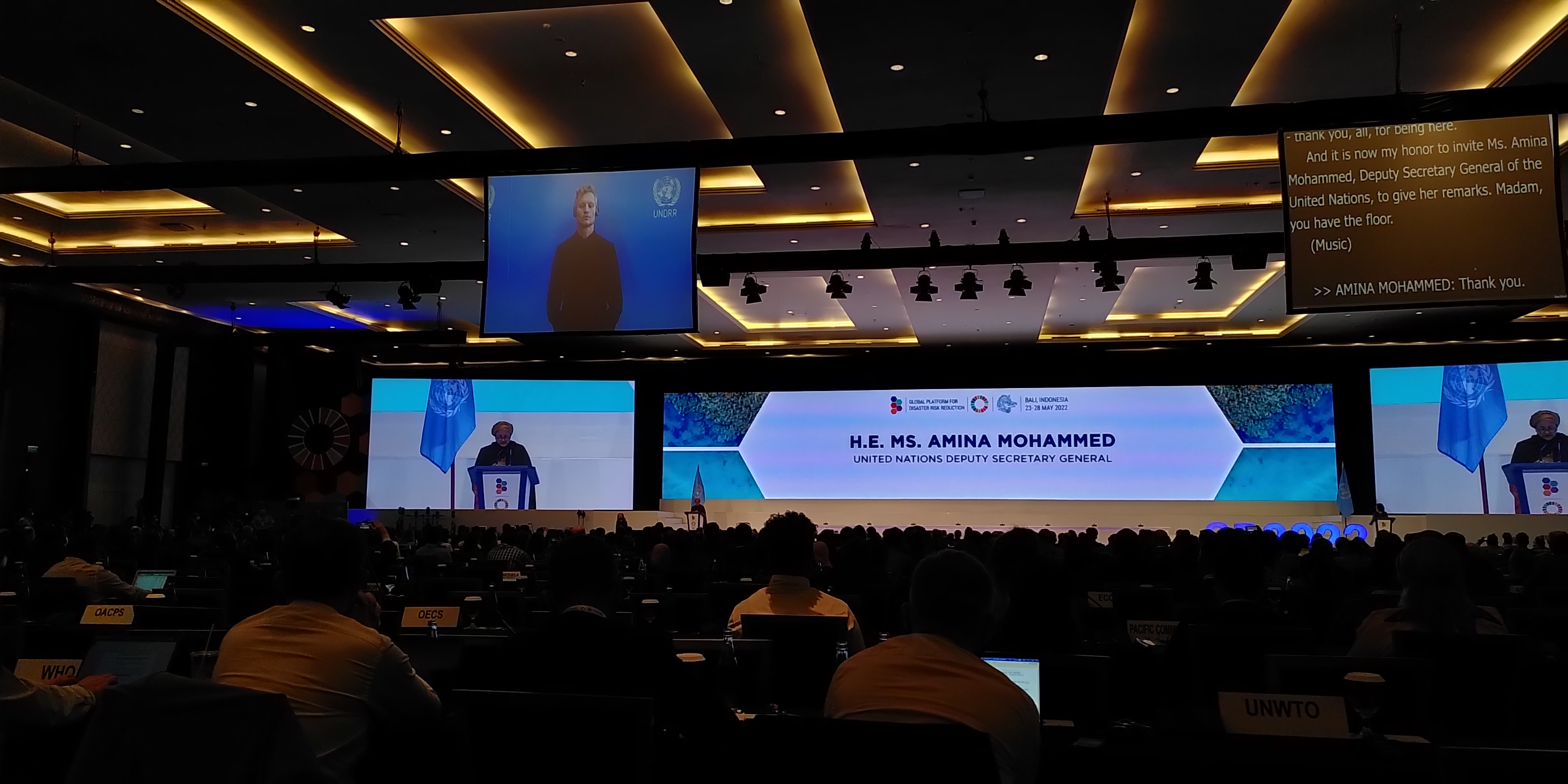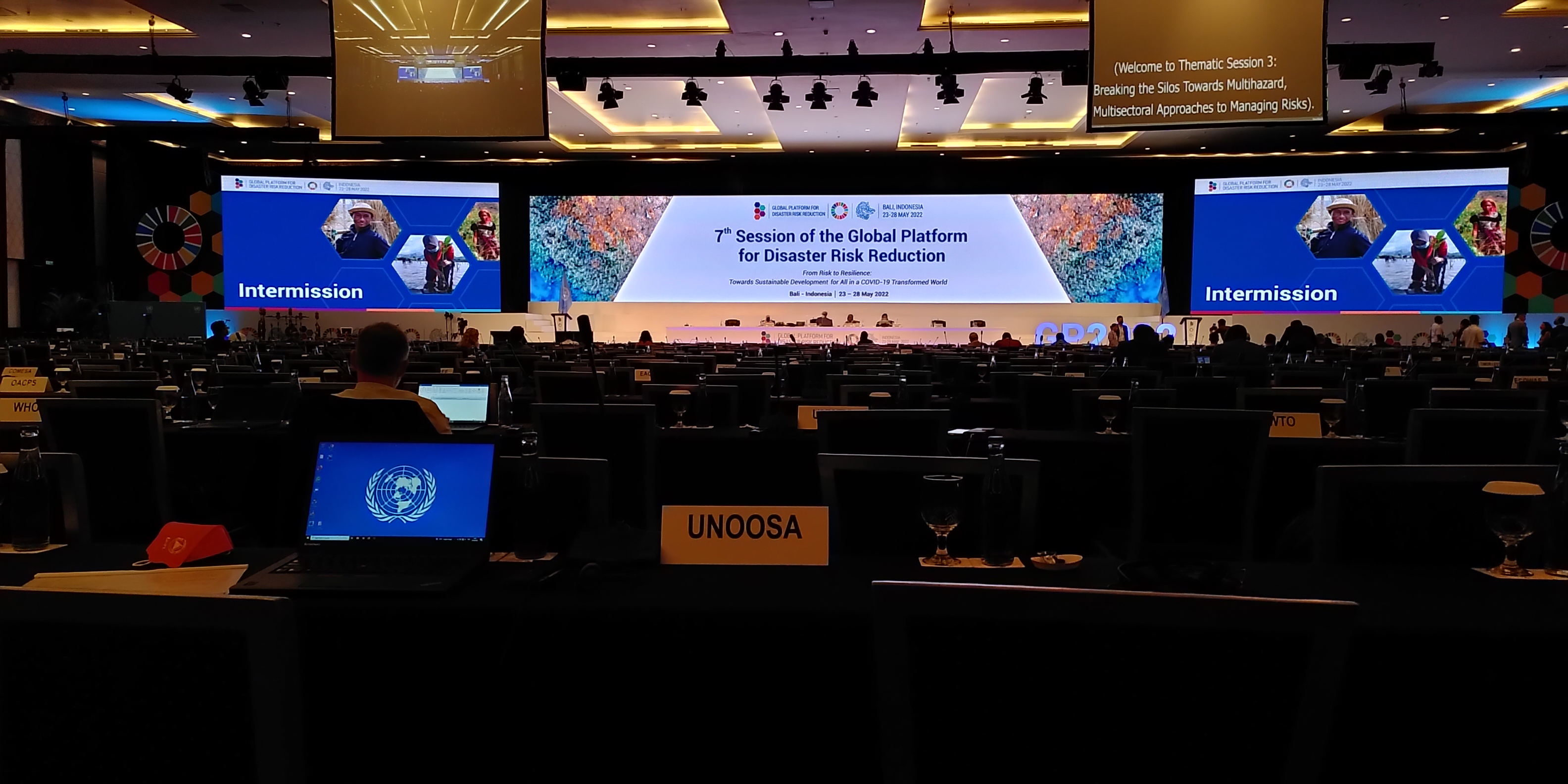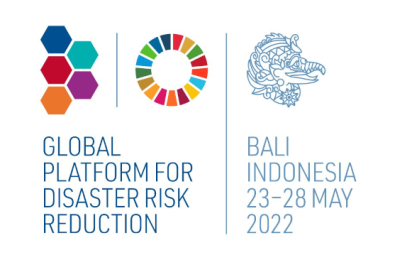From 23 to 28 May the seventh session of the Global Platform on Disaster Risk Reduction 2022 (GP2022) took place in Bali, Indonesia, organized and convened by UNDRR, and hosted by the Government of Indonesia. The event was co-chaired by the Government of Indonesia and UNDRR. More than 4000 participants from 185 countries attended both in person and virtually.
Seven years after the adoption of the Sendai Framework for Disaster Risk Reduction 2015-2030 and a year prior to the culmination of its Mid-Term Review (MTR), the world’s underlying vulnerabilities and inequities were violently exposed by the COVID-19 pandemic.
UN-SPIDER attended the conference to take note of recent advances and developments in the disaster management community, connect to delegates of member states, and to promote the usage of space-based information and technology for disaster risk reduction.
Preventing disasters, reducing, and managing risk, and responding to extreme phenomena are essential if we are to achieve a sustainable future for all. GP2022 repeatedly highlighted the need for a whole-of-society approach to disaster risk reduction (DRR), ensuring no one is left behind. Constructing an inclusive environment, the Global Platform showcased the importance of international solidarity and cooperation and discussed ways to tackle underlying risk drivers both locally and globally.
GP2022 was held under the theme “From Risk to Resilience: Towards Sustainable Development for All in a COVID-19 Transformed World” and was organized across three main sub-themes on: disaster risk governance; COVID-19 recovery; and DRR financing. The meeting further: addressed the Sendai Framework stocktaking for the ongoing MTR; deliberated on actions to reduce disaster risk for the most vulnerable, including Indigenous Peoples, women, youth, and persons with disabilities, and to ensure their full and effective participation in decision making; and highlighted potential synergies with the sustainable development and climate action agendas and policies.
The outcome of GP2022 was summarized in the Co-Chairs’ “Bali Agenda for Resilience.” Its main take-home messages include that:
- a “Think Resilience” approach must be applied to all investments and decision making, integrating DRR to ensure a whole-of-government and whole-of-society approach;
- DRR must be integrated at the core of development and finance policies, legislation, and plans to achieve the 2030 Agenda for Sustainable Development and the Sustainable Development Goals (SDGs);
- the real cost of disasters is that of inaction, which must be weighed against investments in DRR, which again can only be accounted for through systemic changes;
- current greenhouse gas emission levels far exceed their mitigation, resulting in an increase in frequency and intensity of catastrophic events;
- a participatory and human rights-based approach in DRR planning and implementation is crucial as people are affected differently by disasters;
- the development of multi-hazard early warning systems (MHEWS) must be inclusive of communities most at risk with adequate capacity to act on early warnings, and ensure better availability, quality, and sharing of data, financial resources, and effective governance and coordination arrangements to fully implement the call by the UN Secretary-General to ensure every person on Earth is protected by early warning systems (EWS) by 2027;
- the need for a transformative recovery from the COVID-19 pandemic, noting that current approaches are not sufficiently effective, neither in protecting development gains nor in building back better, greener, and more equitably;
- recovery and reconstruction are most successful when they are community-driven and support existing local structures and resilience-building mechanisms, while addressing barriers to inclusivity through gender-responsive and human rights-based approaches;
- ecosystems should be considered as critical infrastructure and recognized for their basic services, bringing environmental, socio-economic, and cultural benefits;
- DRR and climate change adaptation have the common objective of reducing vulnerability and enhancing capacity and resilience, thus a comprehensive disaster and climate risk management approach is critical; and
- risk understanding remains limited, particularly regarding emerging and future hazards, with government policies largely reactive.
The decisions we are called on to take today to address current and imminent hazards, and the resulting actions, matter. During the meeting, Amina J. Mohammed, UN Deputy Secretary-General stressed that “our actions and decisions can inadvertently influence our risk and exposure.” In closing reflections, Mami Mizutori, Special Representative of the Secretary General (SRSG) for DRR and Head of the UN Office for Disaster Risk Reduction (UNDRR) echoed that message, emphasizing that “we can never underestimate the role that human decisions play.”
Access the Co-Chairs’ Summary: Bali Agenda for Resilience here.
Visit the GP 2022 website for more information.



